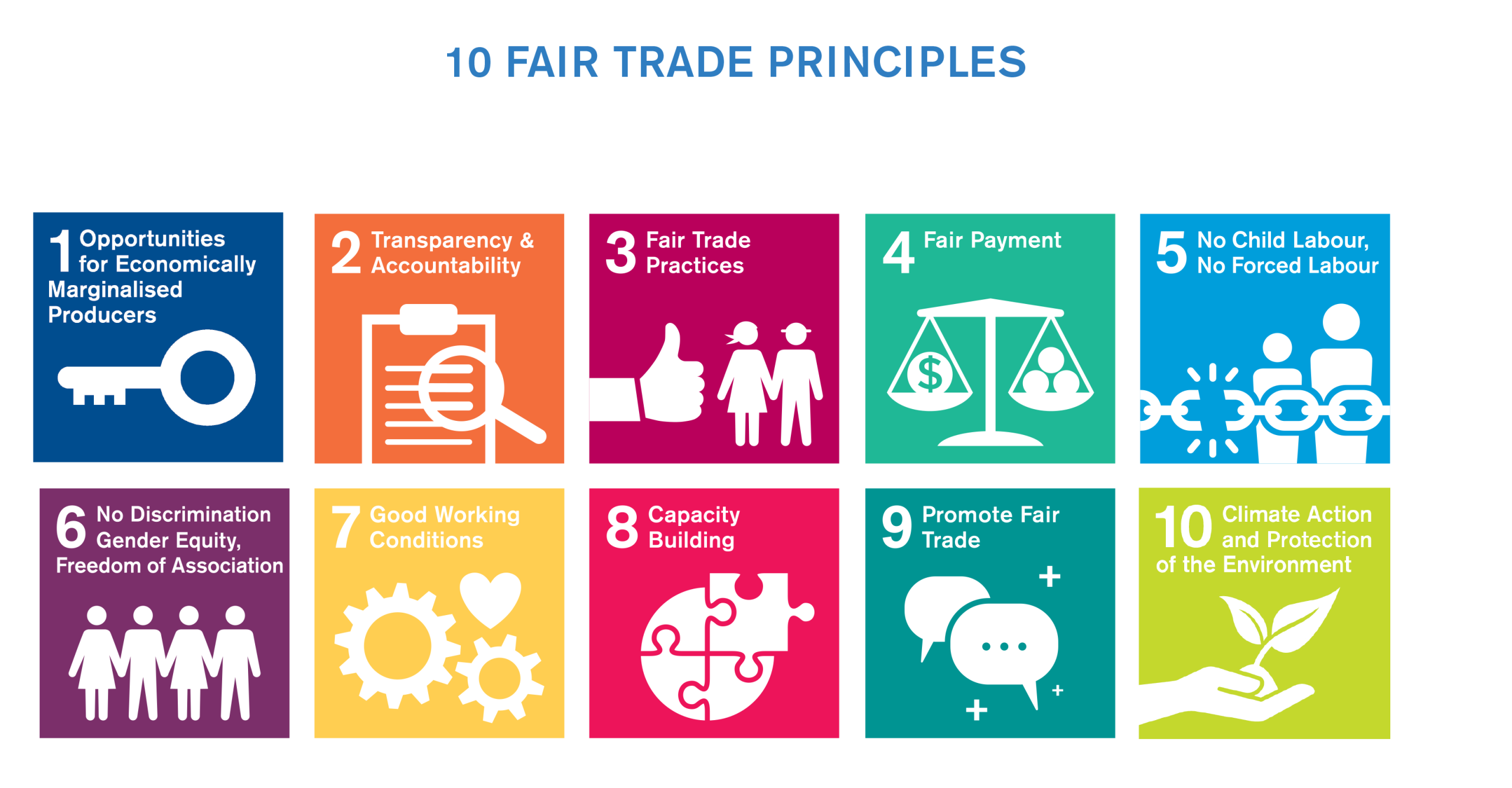
Fair Trade Principles: Supporting Sustainable Communities – Your Guide to Ethical Sourcing
In a world increasingly aware of its interconnectedness, the choices we make as consumers ripple far beyond the checkout counter. Every purchase has a story, and unfortunately, not all stories are fair. From coffee beans to crafted textiles, the global supply chain can often hide stories of exploitation, environmental damage, and communities trapped in cycles of poverty.
But there’s a powerful alternative: Fair Trade. More than just a label, Fair Trade is a global movement built on a set of principles designed to transform trade into a tool for sustainable development. It’s about ensuring producers in developing countries receive a fair price for their work, enjoy safe working conditions, and have the power to invest in their communities and protect their environment.
This comprehensive guide will unpack the core Fair Trade principles, explain how they foster truly sustainable communities, and show you how your everyday choices can make a profound, positive difference.
What Exactly is Fair Trade? Beyond Just a Label
At its heart, Fair Trade is about justice. It’s a partnership between producers and consumers, built on dialogue, transparency, and respect. It seeks to correct the imbalances of conventional trade, which often prioritizes profit over people and planet.
Imagine a farmer in a remote village, growing coffee beans that will eventually end up in your morning cup. In a conventional system, middlemen might pay them a pittance, leaving them unable to afford basic necessities, let alone invest in their farm or community. Fair Trade steps in to change this narrative.
Fair Trade is not charity; it’s about empowerment. It provides a dignified way for farmers and artisans to earn a living wage, improve their communities, and gain control over their futures. It’s a movement that believes everyone deserves a fair chance to thrive.
The Pillars of Progress: Understanding the Fair Trade Principles
While different Fair Trade organizations may phrase them slightly differently, the core principles are universally agreed upon and form the bedrock of the movement. These principles ensure that products bearing the Fair Trade mark meet stringent ethical, social, and environmental standards.
Let’s dive into these foundational principles:
1. Fair Payment: Ensuring a Living Wage and Beyond
This is arguably the most recognizable principle. Fair Trade ensures that producers receive a price that covers their costs of sustainable production and provides a living wage. This isn’t just about survival; it’s about dignity and the ability to plan for the future.
- Fair Price: Producers receive a price that is stable and above the conventional market price, especially during price fluctuations. This provides a safety net and allows for long-term planning.
- Fair Trade Premium: In addition to the fair price, many Fair Trade systems include an extra sum of money called the "Fair Trade Premium." This fund is democratically managed by the producers themselves and invested in community projects.
- Examples of Premium Use: Building schools, providing clean water, healthcare clinics, improving infrastructure, or investing in sustainable farming techniques.
2. Safe and Decent Working Conditions: Prioritizing Well-being
Fair Trade goes beyond just fair pay to ensure that working environments are safe, healthy, and respectful. This is especially crucial in industries where conditions can be hazardous.
- Health & Safety: Strict standards for workplace safety, including proper equipment, training, and emergency procedures.
- Reasonable Hours: Adherence to legal working hours, with limits on overtime and provisions for breaks.
- No Discrimination: A workplace free from discrimination based on gender, race, religion, sexual orientation, or any other factor.
- Freedom of Association: Workers have the right to form and join unions, bargain collectively, and have their voices heard.
3. No Child Labour and Forced Labour: Protecting the Vulnerable
This is a non-negotiable principle. Fair Trade certified organizations strictly prohibit the use of child labor and forced labor in any part of their production process.
- Child Protection: Ensures that children are not exploited for labor, allowing them to attend school and enjoy their childhood.
- No Debt Bondage: Prohibits any form of forced labor, including debt bondage, where individuals are compelled to work to repay a debt.
- Due Diligence: Companies must actively monitor their supply chains to ensure these practices are not occurring.
4. Commitment to Non-Discrimination, Gender Equity, and Women’s Economic Empowerment
Fair Trade actively champions equality and seeks to dismantle discriminatory practices, particularly focusing on empowering women who often face the greatest disadvantages in many communities.
- Equal Pay for Equal Work: Ensures that women receive the same pay as men for the same tasks.
- Leadership Roles: Encourages women to take on leadership positions within producer organizations.
- Access to Resources: Provides women with equal access to training, credit, and land ownership.
- Challenging Social Norms: Works to break down cultural barriers that limit women’s participation and influence.
5. Transparent and Accountable Relationships: Building Trust
Transparency is key to the integrity of Fair Trade. It means open communication and clear understanding between all parties in the supply chain, from farmers to consumers.
- Open Books: Producers and buyers share information about costs, prices, and profits.
- Clear Contracts: Agreements are clear, fair, and mutually beneficial.
- Accountability: Mechanisms are in place for resolving disputes and ensuring adherence to principles.
- Traceability: Consumers can often trace their products back to their origin, understanding the story behind their purchase.
6. Capacity Building: Empowering Producers for the Future
Fair Trade is not just about providing a hand-out; it’s about providing a hand-up. It focuses on strengthening the skills and knowledge of producers so they can thrive independently.
- Training & Education: Providing workshops on sustainable farming techniques, business management, financial literacy, and quality improvement.
- Technical Assistance: Offering expertise to help producers improve their products and processes.
- Market Access: Helping producers connect directly with buyers and understand market demands.
- Organizational Development: Supporting the creation and strengthening of democratic producer organizations (e.g., cooperatives).
7. Promote Fair Trading Practices: Long-Term Partnerships
Fair Trade encourages stable, long-term relationships between buyers and producers, fostering trust and allowing for sustainable growth.
- Long-Term Contracts: Buyers commit to purchasing from producers for extended periods, providing security.
- Pre-financing: Buyers often provide advance payments to producers, helping them cover production costs and avoid exploitative loans.
- Information Sharing: Buyers share market trends and consumer preferences with producers, helping them adapt and improve.
8. Respect for the Environment: Protecting Our Planet
Fair Trade recognizes that environmental health is intrinsically linked to community well-being and long-term sustainability. It promotes environmentally sound farming and production practices.
- Sustainable Resource Management: Encourages practices that conserve water, soil, and biodiversity.
- Reduced Pesticide Use: Promotes organic farming methods and minimizes the use of harmful chemicals.
- Waste Management: Encourages responsible disposal and reduction of waste.
- Climate Change Adaptation: Supports producers in adopting practices that help them cope with the impacts of climate change (e.g., drought-resistant crops).
- Renewable Energy: Encourages the use of renewable energy sources where feasible.
Beyond the Principles: How Fair Trade Builds Sustainable Communities
These principles aren’t just isolated rules; they work together to create a powerful engine for change, leading to truly sustainable communities.
Economic Sustainability: Building Foundations of Prosperity
- Stable Income: A fair price and long-term contracts mean producers can rely on a consistent income, moving away from volatile market prices. This stability allows them to feed their families, educate their children, and escape cycles of debt.
- Investment in Infrastructure: The Fair Trade Premium allows communities to invest in vital infrastructure like roads, electricity, and communication networks, connecting them to wider markets and opportunities.
- Diversification: Producers can invest in new crops or products, reducing their reliance on a single commodity and building resilience.
Social Sustainability: Fostering Health, Education, and Equality
- Improved Health: Access to healthcare facilities, clean water, and better nutrition leads to healthier communities.
- Enhanced Education: Investments in schools, teacher training, and scholarships ensure children have access to quality education, breaking cycles of illiteracy and poverty.
- Gender Equality: Empowering women through leadership roles and economic opportunities strengthens families and communities as a whole.
- Community Cohesion: Democratic decision-making processes within producer organizations foster a sense of ownership and collective responsibility.
Environmental Sustainability: Guardians of the Earth
- Ecological Stewardship: Fair Trade practices promote farming methods that protect the environment, ensuring the land remains productive for future generations.
- Biodiversity Protection: Sustainable farming often means preserving local ecosystems and biodiversity, which is crucial for ecological balance.
- Climate Resilience: By encouraging sustainable and adaptive practices, Fair Trade helps communities better withstand the impacts of climate change, such as extreme weather events.
Why Choose Fair Trade? The Impact of Your Purchase
Choosing Fair Trade isn’t just about buying a product; it’s about making a statement and contributing to a better world.
For Producers:
- Empowerment: They gain a voice, control over their lives, and the ability to invest in their own futures.
- Dignity: They are treated as partners, not just cogs in a machine.
- Stability: A fair price and long-term relationships offer security against volatile markets.
- Community Development: Their entire community benefits from investments in education, health, and infrastructure.
For Consumers:
- Peace of Mind: You know your purchase isn’t contributing to exploitation or environmental harm.
- Quality Products: Fair Trade standards often lead to higher quality products, as producers are incentivized to invest in their craft.
- Transparency: You can trust that the product has been ethically sourced.
- Global Impact: Your choice directly contributes to poverty reduction, social justice, and environmental protection worldwide.
For the Planet:
- Reduced Environmental Footprint: Support for sustainable and organic farming practices helps protect our natural resources.
- Climate Action: Encourages methods that mitigate climate change and help communities adapt to its effects.
How You Can Make a Difference: Simple Steps to Support Fair Trade
Making Fair Trade choices is easier than you think. Here’s how you can start:
- Look for the Labels: Familiarize yourself with common Fair Trade certifications like the FAIRTRADE Mark (Fairtrade International), Fair for Life, or products certified by the World Fair Trade Organization (WFTO).
- Start Small: Begin by swapping out one or two everyday items, like your coffee, tea, or chocolate, for Fair Trade certified options.
- Educate Yourself: Learn more about the products you consume and the stories behind them.
- Spread the Word: Share what you’ve learned with friends and family. Encourage your local stores and cafes to stock Fair Trade products.
- Support Fair Trade Businesses: Seek out brands and retailers that are committed to ethical sourcing. Many companies specialize in Fair Trade goods.
- Demand Transparency: Ask questions about where your products come from and how they are made. Your curiosity as a consumer drives change.
Conclusion: Your Choice, Their Future
Fair Trade principles offer a powerful blueprint for a more just and sustainable global economy. They demonstrate that commerce can be a force for good, lifting communities out of poverty, protecting our planet, and fostering dignity for all.
By understanding and supporting these principles, you become an active participant in building a world where fairness, equity, and sustainability are not just ideals, but realities. Every Fair Trade purchase you make is a vote for a better future – a future where every producer is valued, every community thrives, and our planet is respected. Choose Fair Trade, and be part of the change.



Post Comment